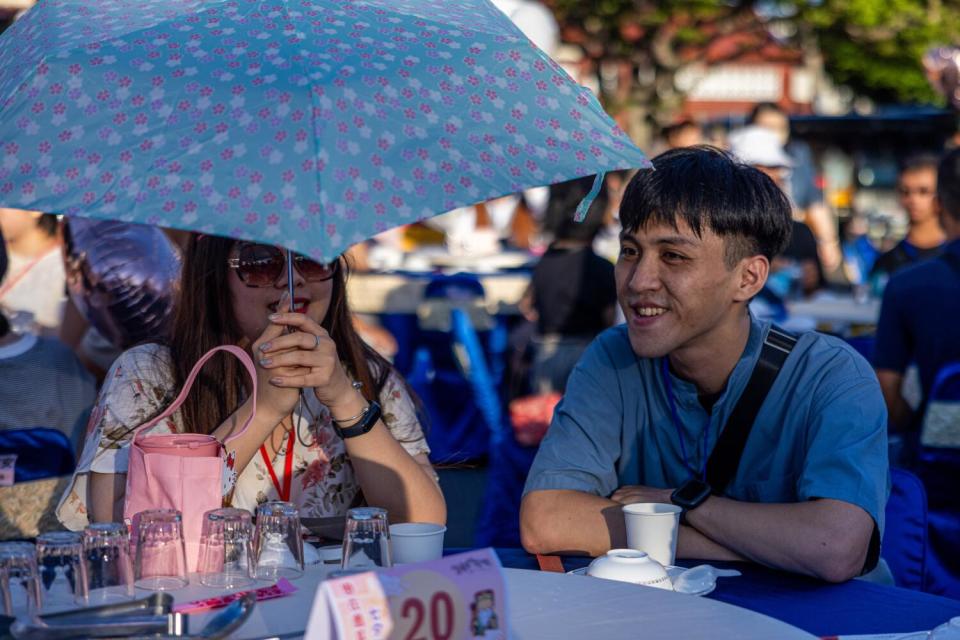Looking for a date? In Taiwan, the government is here to help

Hsu Yu-hsin wasn’t sure what to expect when she attended her first singles mixer in the summer at a temple to Taiwan’s god of marriage. But even in the blistering heat, the 37-year-old makeup artist enjoyed mingling with the other attendees, except for one peculiar group: the local officials and dignitaries enthusiastically encouraging everyone to find love — and fast.
“You should pair up as quickly as possible and have kids as quickly as possible,” temple chairman Wang Tseng-rong told the crowd, after thanking different government departments in the city of Tainan for their assistance in organizing the matchmaking event. “We hope that the mayor will support us in our next event, and we can solve Taiwan’s national crisis together.”
The crisis in question — a birthrate falling to record lows — is one facing countries across East Asia. As social values have shifted and young people have grown more pessimistic about their economic prospects, fertility rates from South Korea to China to Singapore have sunk, raising concerns over the consequences of a rapidly shrinking — and aging — population.
Even at the city-sponsored mixer in Tainan, which took place in August the weekend before Chinese Valentine’s Day, some participants remained ambivalent about marriage and starting a family, a sign of the challenges officials face in convincing younger generations to help reverse depopulation.

Hsu, who had traveled two hours by train from Taipei, bonded with another participant over their appreciation of Tainan street food, and joined him for a late-night snack. However, she decided afterward they were better off as friends. Since turning 30, she had stopped feeling any pressing need to wed and have children, particularly after seeing others around her struggle with multiple kids.
“Having children is easy. Raising them is really hard,” said Hsu, citing the costs of buying a car, a home and everyday goods. “Today’s economic pressures are too much. No one is willing to have them because it will impact their quality of life.”
Read more: Inside Japan’s ‘miracle town,’ where the birth rate is soaring amid a demographic crisis
Fewer Taiwanese even want to get hitched these days. In a 2019 survey by Taiwan’s Ministry of Health and Welfare, 38.6% of women said they were not interested in marriage, compared with 12.4% in a similar survey from 2011. For every 1,000 people, there were 4.88 marriages in 2021 — a record low in government data going back more than a quarter-century.
Taiwan’s government has acted as an intermediary in helping singles find partners for nearly three decades. But playing Cupid has taken on a greater sense of urgency as Taiwan’s fertility rate, or the number of children the average woman will bear in her lifetime, fell to 0.87 in 2022.
That rate, a record low in data dating to 1951, is far below the 2.1 required to maintain a stable population. Birthrates below that level mean that a growing subset of elderly people must rely on the dwindling support of younger workers, with the problem compounding as the overall number of women able to bear children shrinks as well.

Only in South Korea was the birthrate lower last year, at 0.78. In Japan, Prime Minister Fumio Kishida has warned that the low birthrate of 1.26 must be addressed immediately and risks rendering society unable to function. In April, the country launched an agency dedicated to new measures supporting families with young children.
Taiwan's presidential candidates, ahead of an election in January, are raising the issue in their campaigns. Vice President William Lai has said the declining birthrate should be a top priority, and touted the current administration's population policies. Opposition candidate Hou Yu-ih has proposed more subsidies for egg-freezing and for families with three children. Terry Gou, the billionaire founder of major Apple supplier Foxconn, who is making a long-shot bid, suggested gifting cats and dogs to new parents to incentivize births, since raising pets is an increasingly popular pastime in Taiwan — often in lieu of raising kids.
But the proposals come long after the ideal time for action, said Lin Wan-i, the government minister in charge of Taiwan's population policy. In 2008, Lin published a white paper to try to draw attention to the issue of declining birthrates. But it took another decade for the government to start implementing broader policies to encourage child-rearing, he said.
Read more: Iran is urging people to have babies — and making life hard for those who don't want to
“It’s like sending someone to the ICU too late. The timing is too slow, but you still need to think of a plan to rescue them,” he said.
Now, Lin is working to counter several economic and social trends that have dampened the desire to have children in Taiwan. The easiest to address has been the high cost of child care, Lin said, which the government aims to mitigate through measures such as expanding public child-care facilities, providing tuition subsidies and capping preschool fees.
Stagnant wage growth and high housing prices pose tougher challenges. According to the Ministry of the Interior, the ratio of Taiwan’s median price of homes to the median annual household disposable income reached a record high last year of nearly 10 to 1, doubling over the last two decades.
Efforts to raise the minimum wage, tax owners of multiple homes and construct more affordable housing have done little to bridge the gap in a society where buying a house before starting a family is the traditional expectation.

For Shen Pin-yu, 39, watching her younger brother and his wife spend nearly all their monthly income raising their 3-year-old daughter exemplifies why people have become more reluctant to have children. She said she would rather stay single and childless than start a family with someone who is financially worse off than she is.
“Housing is getting more expensive, goods are getting more expensive,” said Shen, who works in marketing at a real estate firm in Taichung, a city in central Taiwan. “Before, they also worried about financial troubles, but now that they have a kid, they have this responsibility.”
In 2021, Taiwan increased the amount of pay that new parents can receive during maternity or paternity leave to 80% of their salaries, up from 60%. Lin said that officials are now considering boosting that further, or lengthening the duration of paid leave beyond six months, but that the government isn’t sure it can afford to do so, having spent more than $3 billion already on child-rearing initiatives.
Read more: Pope joins in urging Italians to have more kids, not just pets
“We have to do this step by step,” he said. “If we can get the birthrate up to or above 1.1 this year, then we can continue working hard to stabilize this trend.”
Pai Yi-che, a 28-year-old subway maintenance worker in Taichung, said he can't even consider getting married right now with his current salary of $1,100 a month. Still, he signed up for a local government-sponsored dating event in July, since he has had trouble meeting potential partners in male-dominated work and school settings.
"I want to find and try out a steady relationship, since I haven't had that before," he said. "If there is the opportunity, I would like to have children."

To help young people date, Lin said universities in Taiwan have added courses on relationships and meeting new people. The government is also studying matchmaking initiatives in Japan and Singapore, to assess how it might expand singles events or take advantage of artificial intelligence and online platforms, he said.
“There are some people who think: Why is the government so intrusive?” Lin said. “I don’t think it can hurt. Whether it will have any impact, no one knows.”
Chen Yu-hua, an associate professor at National Taiwan University and the former president of the Population Assn. of Taiwan, said even though local governments started dedicating more time and resources to matchmaking activities back in 2010, there have been few success stories.
“A lot of surveys and analyses say people do not really marry or have babies because they cannot find Mr. or Ms. Right,” she said. “I don’t think it’s so easy to increase the marriage or fertility rate.”
Another issue, she said, is that the matchmaking events are often much more popular among men than women, who are less inclined these days to prioritize family life, which is still largely patriarchal, over their careers, as gender roles in the workplace have become more progressive.
“Now a lot of people are chasing their own goals, so they will prefer to have their own time to pursue what they want,” said Chen Chian-yi, a 26-year-old graphic designer who attended the Tainan matchmaking event in August. “Having kids and getting married is not the first choice anymore.”

In high school, Chen imagined that she would be married by now and on her way to having three kids. But over the last few years, she's come to the conclusion that she has no interest in either marriage or children. She ended up leaving the singles mixer early with her two friends, put off by the heat, the flies and the realization that some participants, armed with pens and notepads, took finding a partner much more seriously than the three of them did.
“When I was younger, I was more idealistic. I didn’t think about the reality of things," Chen said. "Hearing stories from friends around me about what it's like being married and having kids rattled that perspective."

The Tainan government held its first singles event in 2019 in an attempt to facilitate more relationships — and, hopefully, more births down the line. It has hosted three mixers in all, resuming this year after a pandemic-induced hiatus.
While the events have led to dozens of initial matches, the government has yet to send its first congratulatory wedding gift, said Chiang Lin-huang, the city’s director of civil affairs. However, he hopes it can at least prompt young people to start thinking about pairing up and settling down.
“We want to remind people that they’ve already reached marrying age and should start seriously looking for their future life partner,” Chiang said. “It lets the people know the government really cares about this, and that they also need to be worried about these major life matters.”
Yang is a Times staff writer and Shen a special correspondent.
This story originally appeared in Los Angeles Times.

